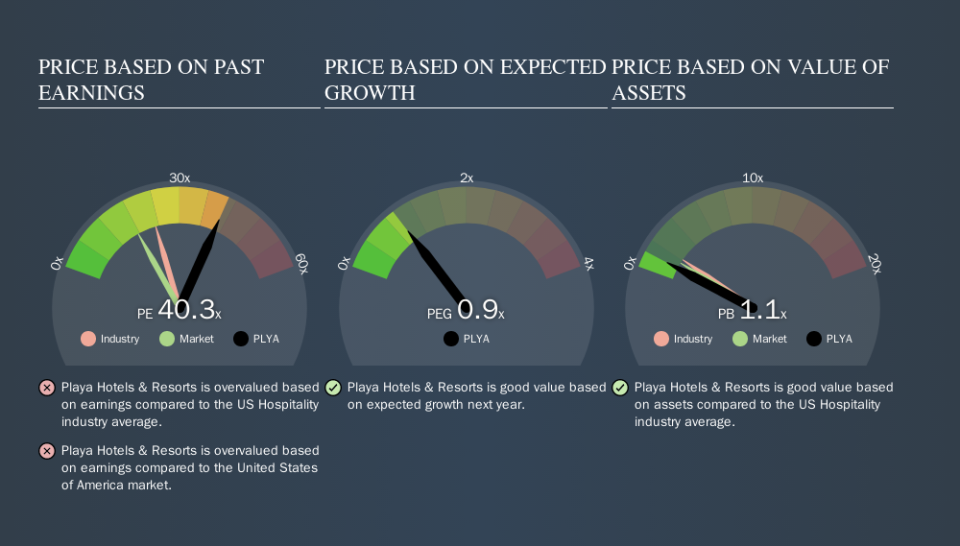Don't Sell Playa Hotels & Resorts N.V. (NASDAQ:PLYA) Before You Read This

This article is for investors who would like to improve their understanding of price to earnings ratios (P/E ratios). We'll look at Playa Hotels & Resorts N.V.'s (NASDAQ:PLYA) P/E ratio and reflect on what it tells us about the company's share price. Playa Hotels & Resorts has a price to earnings ratio of 40.34, based on the last twelve months. That corresponds to an earnings yield of approximately 2.5%.
Check out our latest analysis for Playa Hotels & Resorts
How Do You Calculate A P/E Ratio?
The formula for P/E is:
Price to Earnings Ratio = Share Price ÷ Earnings per Share (EPS)
Or for Playa Hotels & Resorts:
P/E of 40.34 = $7.53 ÷ $0.19 (Based on the year to June 2019.)
Is A High Price-to-Earnings Ratio Good?
A higher P/E ratio implies that investors pay a higher price for the earning power of the business. That is not a good or a bad thing per se, but a high P/E does imply buyers are optimistic about the future.
How Does Playa Hotels & Resorts's P/E Ratio Compare To Its Peers?
We can get an indication of market expectations by looking at the P/E ratio. You can see in the image below that the average P/E (23.0) for companies in the hospitality industry is lower than Playa Hotels & Resorts's P/E.
That means that the market expects Playa Hotels & Resorts will outperform other companies in its industry. The market is optimistic about the future, but that doesn't guarantee future growth. So investors should delve deeper. I like to check if company insiders have been buying or selling.
How Growth Rates Impact P/E Ratios
P/E ratios primarily reflect market expectations around earnings growth rates. If earnings are growing quickly, then the 'E' in the equation will increase faster than it would otherwise. That means even if the current P/E is high, it will reduce over time if the share price stays flat. So while a stock may look expensive based on past earnings, it could be cheap based on future earnings.
Playa Hotels & Resorts shrunk earnings per share by 3.0% last year.
Don't Forget: The P/E Does Not Account For Debt or Bank Deposits
Don't forget that the P/E ratio considers market capitalization. Thus, the metric does not reflect cash or debt held by the company. Theoretically, a business can improve its earnings (and produce a lower P/E in the future) by investing in growth. That means taking on debt (or spending its cash).
Spending on growth might be good or bad a few years later, but the point is that the P/E ratio does not account for the option (or lack thereof).
Playa Hotels & Resorts's Balance Sheet
Net debt totals 93% of Playa Hotels & Resorts's market cap. This is enough debt that you'd have to make some adjustments before using the P/E ratio to compare it to a company with net cash.
The Verdict On Playa Hotels & Resorts's P/E Ratio
Playa Hotels & Resorts has a P/E of 40.3. That's higher than the average in its market, which is 17.5. With relatively high debt, and no earnings per share growth over twelve months, it's safe to say the market believes the company will improve its earnings growth in the future.
When the market is wrong about a stock, it gives savvy investors an opportunity. People often underestimate remarkable growth -- so investors can make money when fast growth is not fully appreciated. So this free visual report on analyst forecasts could hold the key to an excellent investment decision.
But note: Playa Hotels & Resorts may not be the best stock to buy. So take a peek at this free list of interesting companies with strong recent earnings growth (and a P/E ratio below 20).
We aim to bring you long-term focused research analysis driven by fundamental data. Note that our analysis may not factor in the latest price-sensitive company announcements or qualitative material.
If you spot an error that warrants correction, please contact the editor at editorial-team@simplywallst.com. This article by Simply Wall St is general in nature. It does not constitute a recommendation to buy or sell any stock, and does not take account of your objectives, or your financial situation. Simply Wall St has no position in the stocks mentioned. Thank you for reading.


